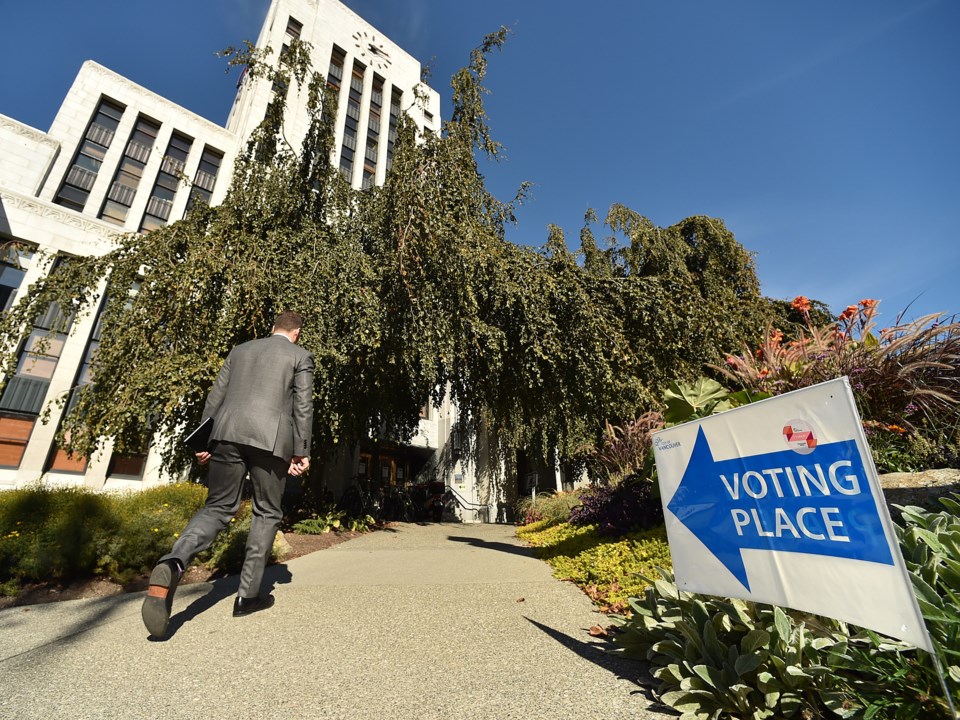Well Vancouver, you’ve gone and stepped in it again.
We’re in the midst of unprecedented crises in housing affordability and opioids and the middle class is disappearing en masse.
Evidently, barely 40 per cent of you give a damn. ��
Voter turnout in the Oct. 20 election was 39.4 per cent. It was 43 per cent in 2014 and traditionally hovers in the low 30s.
Only twice has voter turnout exceeded the 40 per cent threshold since 1996.
By comparison, federal elections during the same time period have consistently brought in close to 60 or 70 per cent. Provincial elections, meanwhile, have attracted between 50 and 60 per cent of voters since 2001.
I spoke to academics and an election reform advocate two weeks before the election to understand the reasons why. Ridiculously long ballot, too many parties and a lack of a ward system, they said.
I voted at Holy Trinity Anglican Church on Saturday morning, around 10:30 a.m. All in, the process took 40 minutes. This gave me plenty of time to survey my fellow voters. At least 85 per cent of the roughly 60 people in the room were seniors.
I was reminded of this scene when I received voter turnout numbers in my inbox on Monday morning. I wondered if the very people — millennials, xennials or whatever you want to call them — who have the most to gain or lose bothered to vote.
And so, as any scientifically valid pollster does, I turned to social media. I put the question on my Facebook page and on Twitter: If you didn’t vote, tell me why.
Being the tire fire Twitter is, I got a few anonymous responses: it was sunny out, so I didn’t vote. Who cares? One person said he voted but some of the fringe candidates
made “the entire thing look like a cheap farce.”
To Facebook we go. I’m 39, and most of the people who piped in were between their mid-20s and mid-40s. These are the generations that will inherit tomorrow the decisions made today.
Here’s a sampling of some of the responses I received. They’re verbatim, save for some editing for spelling and grammar.
“I did not do any research whatsoever towards any of the candidates and didn't want to vote for someone I didn’t agree with. I know people can say to vote for the independent to further the notion of parties beyond the few major parties ... not to justify my ignorance but deep down I simply did not want to vote for Green or an independent if I didn't agree with them and/or their platform.”
Fair enough. The same person took ownership of the situation and said he’ll educate himself better in four years’ time.
“I voted but it was very limited. I voted for the mayor of the party I thought was the least douchey and wasn’t full of shit. Hard choice. And I had some friends running for the park board. So I voted for them. I knew nothing about the other[s]… so I didn't vote for any of them. So in all, I cast four votes.”
There’s that damn lengthy ballot rearing its head again.
“I feel voting in this city does not matter anyway. No one cares about the poor.”
Ouch.
“Had seven staples in my head from a fall Friday evening. On the couch recovering.”
Could’ve voted in the advance polls, but valid point.
“I voted but there were signs all over saying, ‘it’s too busy come back later,’ I’m sure that stopped [people].”
This was a common refrain that I heard many times on Saturday.
The most interesting response I got out of the 30 comments posted actually encouraged non participation. Rather than re-post all 350 words, the Coles Notes version goes like this: there is no proof voting changes anything, everyone we’ve voted in since the dawn of time has been power hungry and self-serving and has done nothing to change the status quo.
“The only acceptable way to move forward from the current system is mass non-participation. Participation in the current system legitimizes and enables it. We then have a placebo for action, and continue on our way having placed our power and our trust in the hands of a system that was never designed for us, and is incapable of helping us. If it was, it would have already. We can’t walk down Hastings Street and continue to believe that this system will save us,” the post reads.
��
Yikes.
The next civic election happens in 2022. That’s four years to give it some thought.
@JohnKurucz
��



